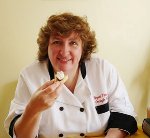08/01/2017
COLUMNS
Note from Alice
Celiac Disease: The Right Questions
HEALTH/WELLNESS
FOOD/LIFESTYLE
Celiac Straight Talk
Listen to the latest podcast episode
NEWS & UPDATES
Note from Alice: Celiac Disease, The Right Questions
 Some of you may have read the article in the Atlantic titled, “Science Has Begun Taking Gluten Seriously.” It was a welcome piece, but what struck me was that while scientists are beginning to ask questions about gluten, they aren’t always necessarily asking the right questions—at least for those of us suffering from celiac disease.
Some of you may have read the article in the Atlantic titled, “Science Has Begun Taking Gluten Seriously.” It was a welcome piece, but what struck me was that while scientists are beginning to ask questions about gluten, they aren’t always necessarily asking the right questions—at least for those of us suffering from celiac disease.
The Atlantic story points out a recent study with eye-catching headlines declaring that gluten does not cause heart disease. Great, except, people with celiac disease don’t do it to prevent heart disease. For us, eating gluten causes an autoimmune response that wreaks havoc on our intestines, which in turn damages our bodies. Celiac disease can cause more than 300 symptoms, many gastrointestinal, but others that range from anemia to infertility. So while the Atlantic eventually explains why it was, in fact, a decent question to ask because of the widespread adoption of the gluten-free diet by those who’ve been misled to believe it’s generally healthier, there’s a lot more celiac disease research being done that deserves attention.
The Right Questions
The truth is, there are a lot of questions we need answers to. Why do some people who are genetically at-risk develop the disease and others not? How do we increase the rate and timeliness of diagnoses? How do we make diagnosis easier? Why do some people diagnosed with celiac disease not get better on the gluten-free diet? What questions do researchers need to be asking patients in order to make real progress toward treatment options? When will alternative treatments be available to those who want to use them? And most importantly, how do we cure celiac disease?
The good news is scientists are seeking these answers. One study looking into the development of celiac disease, The Celiac Disease Genomic Environmental Microbiome and Metabolic Study (CDGEMM), is following the development of celiac disease in babies, affectionately called GEMMs. CDGEMM is an extensive study of the genetic makeup, environmental conditions and gut microbiome of participating babies and children. “Our goal is to identify how these factors contribute to disease development so that, in the future, we may be able to predict who will develop celiac disease before it happens,” researchers explain.
Another study is following a group of 1300 children in Colorado to get a better picture of the natural life of celiac disease. Recent results showed that by age 15, slightly more than 3 percent of Denver children followed for up to 20 years had developed celiac disease, a rate about three times higher than that typically cited for the overall U.S. population. These findings raise a host of other questions. Researcher Edwin Liu, MD suggests that the marked increase in celiac disease found in the study “may be a new phenomenon that has affected this current generation of youth.” He adds, “It does beg the question as to whether or not there are new environmental triggers for celiac disease that our population faces now, compared to before,” he said, noting that it is possible there is something unique to Colorado. “But we just don’t know.”
For those diagnosed with celiac disease, research is revealing that the gluten-free diet is not as effective or complete a treatment as once thought. Scientists from the Celiac Research Program at Harvard Medical School found that 19 percent of the children they studied had persistent intestinal damage even while on the gluten-free diet.
The good news is that there are currently six types of treatment in varying phases of research seeking to find additional options for patients. Combined with, and perhaps one day in place of, the gluten-free diet, these could improve the health and quality of life for celiac disease patients.
But we are still some distance away from getting a celiac disease drug approved. If you’re a person affected by celiac disease, you can help by staying abreast of the latest news and volunteering for research studies. You can sign up for our online community and share your story at www.Go.BeyondCeliac.org to make sure your voice is heard. Beyond Celiac presents clear and relevant research news as well as an easy-to-use clinical trials finder and an interactive drug development pipeline to illustrate the progress in the field. We are also building an on-line community to make sure that people with celiac disease are active participants in research efforts.
It’s time that get the answers we need, and our involvement in research is the fastest route to get them.
To living life Beyond Celiac,
Alice Bast
Beyond Celiac CEO
Gluten-Free Cooking with Oonagh
Gluten-Free B
lueberry Cake & Blueberry Fruit Trifle
 Two gluten-free blueberry dessert recipes in one!
Two gluten-free blueberry dessert recipes in one!
 A muy delicioso recipe for gluten-free mango salsa that is great by itself or atop grilled chicken or fish.
A muy delicioso recipe for gluten-free mango salsa that is great by itself or atop grilled chicken or fish.
About Chef Oonagh Williams

British born Chef Oonagh Williams holds a culinary arts degree and spends her time cooking, writing, speaking, and educating the public on gluten-free and allergy-free diets. She herself has celiac disease along with other food allergies. When not writing or speaking nationally on food, she teaches cooking classes, hosts dinner parties, and offers one-on-one help. Locally, she teaches healthier food cooking classes including vegetarian cooking for everyone, as most real food is naturally gluten-free and free of many other allergens. Chef Oonagh had the honor of being a speaker at the Boston Celiac Symposium, alongside top doctors from Beth Israel, Mass General, and Harvard Medical School.
Buy herDelicious Gluten-Free Cooking e-book, over 200 pages, full color photos, only $20;
like her Facebook page, Gluten-Free Cooking with Oonagh, where she posts recipes, links to her appearances, and gluten-free products she’s discovered; and connect with her on Skype for help in following a food allergy diet.
Children May Not Need a Biopsy for Celiac Disease Diagnosis
By Amy Ratner, Medical and Science News Analyst

Children who have symptoms and certain definitive blood test results do not need a biopsy to be diagnosed with celiac disease, a large, international study has found.
More than half the children with celiac disease worldwide could avoid the risks and costs of having an endoscopy and anesthesia, according to the authors of the study, which was published in the journal, Gastroenterology.
Celiac Disease Patients Warned about Dietary Supplements
By Amy Ratner, Medical and Science News Analyst
 With names like Gluten Aid, Gluten Cutter, Gluten Defense and GlutenEase, these dietary supplements sound like they might be a valuable tool for managing the gluten-free diet. And that’s part of the problem, according to a new study from the Celiac Disease Center at Columbia University.
With names like Gluten Aid, Gluten Cutter, Gluten Defense and GlutenEase, these dietary supplements sound like they might be a valuable tool for managing the gluten-free diet. And that’s part of the problem, according to a new study from the Celiac Disease Center at Columbia University.
Despite names that seem to promise a way to prevent the damage from gluten, those who have celiac disease need to be wary of over-the-counter dietary supplements that claim to degrade gluten, the study found.
Allergic LivingSneak Peak: Celiac That’s Skin Deep: The Mysterious Rash Sparked by Gluten
By Amy Ratner
 James Mcclymont was a 25-year-old truck driver when he mysteriously broke out in a blistery rash on his elbows, knees, crotch and the side of his face. He says the itching was so bad he can still remember how it felt decades later…
James Mcclymont was a 25-year-old truck driver when he mysteriously broke out in a blistery rash on his elbows, knees, crotch and the side of his face. He says the itching was so bad he can still remember how it felt decades later…
Photo credit: Allergic Living
Listen to Episode 3 of Celiac Straight Talk
.jpg)
Patients Managing the Disease on their Own
Research shows celiac disease patients are on their own when it comes to care. Most people who get diagnosed with celiac disease don’t go back to their doctor for follow up care, shows a study done by Beyond Celiac and researchers from Columbia and Vanderbilt universities. Patients manage the diet and deal with whatever symptoms they suffer on their own. But what are the consequences?
What’s Hot
- 2017 Beyond Celiac Community Impact Survey, let us know how we’re doing!
- Blue Skies Gallery Auction, August 26 in Hampton, VA, proceeds go to Beyond Celiac in memory of Carly Abrams, who had celiac disease.
- The Bold Beyond Symposium, the premier event for celiac research! Join us in person or via webcast!
- Independence from Gluten, the free Beyond Celiac gluten-free summer e-cookbook.
- What’s a Practicing Catholic with Celiac Disease to Do?, on communion doctrine and the emotional burdens of celiac disease.








